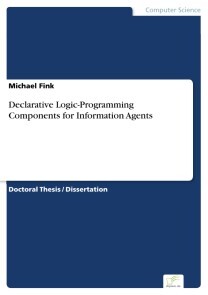Inhaltsangabe:Abstract: At present, the World Wide Web faces several problems regarding the search for specific in formation, arising, on the one hand, from the vast number of information sources available, and, on the other hand, from their intrinsic heterogeneity. A promising approach for solving the complex problems emerging in this context is the use of information agents in a multi-agent environment, which cooperatively solve advanced information-retrieval problems. An intelligent information agent provides advanced capabilities resorting to some form of logical reasoning, based on ad-hoc-knowledge about the task in question and on background knowledge of the domain, suitably represented in a knowledge base. In this thesis, our interest is in the role which some methods from the field of declarative logic programming can play in the realization of reasoning capabilities for intelligent information agents. We consider the task of updating extended logic programs (ELPs), since, in order to ensure adaptivity, an agent¿s knowledge base is subject to change. To this end, we develop update agents, which follow a declarative update policy and a reimplemented in the IMPACT agent environment. The proposed update agents adhere to a clear semantics and are able to deal with incomplete or in consistent information in an appropriate way. Furthermore, we introduce a framework for reasoning about evolving knowledgebases, which are represented as ELPs and maintained by an update policy. We describe a formal model which captures various update approaches, and define a logical language for expressing properties of evolving knowledge bases. We further investigate these mantical properties of knowledge states with respect to reasoning. In particular, we describe finitary characterizations of the knowledge evolution, and derive complexity results for our framework. Finally, we consider aparticular problem of information agents, namely information source selection, and develop an intelligent site-selection agent. We use ELPs for representing relevant knowledge and for declarative query an alysis and query abstraction. We define syntax and semantics of declarative site-selection programs, making use of advanced methods from answer set programming for priority handling and quantitative reasoning. A site selection component is implemented on top of the DLVKR system and its plp front-end for prioritized ELPs. We report experimental results for this implementation, [...]

